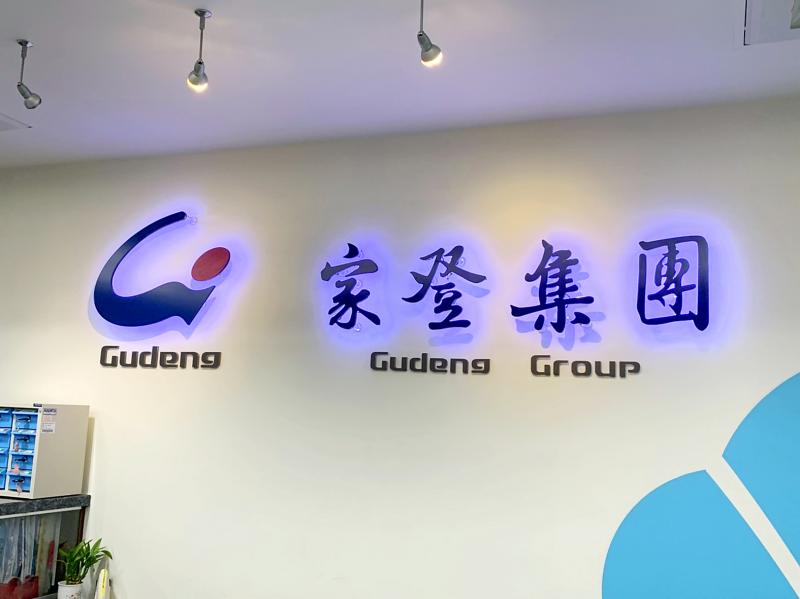Gudeng Precision Industrial Co Ltd (家登), the sole supplier of extreme ultraviolet (EUV) pods to Taiwan Semiconductor Manufacturing Co (TSMC, 台積電), yesterday forecast record, double-digit percentage revenue growth for this year.
The company said that new orders from Chinese semiconductor companies would add to already strong demand, which it plans to meet with a new plant in New Taipei City’s Tucheng District (土城).
It is to hold a groundbreaking ceremony next month or in March, it said.

Photo: Grace Hung, Taipei Times
Remote working and the stay-at-home economy have caused a surge in demand for semiconductor products used in a wide range of Internet-based devices, servers and data-storage units, Gudeng chairman Bill Chiu (邱銘乾) told reporters in Tainan.
GROWING CAPACITY
The firm has “clear order visibility” for this quarter, as its main products — EUV, deep ultraviolet and wafer pods — all show strong demand, it said, adding that Chinese customers have offered visibility to next quarter.
Gudeng’s comments came after TSMC on Jan. 14 forecast quarterly revenue growth of up to 2.52 percent, bucking a seasonal lull in the January-to-March quarter.
Gudeng also supplies pods to Intel Corp.
EUV pods are to make up about 60 percent of its wafer pods, up from 50 percent last year, Chiu said.
The company has increased its installed capacity of EUV pods from 1,000 units per month last year to 1,500 units, with plans to increase capacity to 2,000 units by the end of the year, he said.
Gudeng expects a double-digit percentage increase in revenue this year from NT$2.5 billion (US$88.06 million) last year, as its major customer accelerates production of 5-nanometer chips, which require more EUV pods than 7-nanometer production.
‘OPTIMISTIC’
In China, Gudeng has secured orders of 8-inch and 12-inch wafer pods, and wafer cassettes from United Semiconductor (Xiamen) Co Ltd (聯芯科技), Jiangsu Changjiang Electronics Technology Co Ltd (蘇州長電) and Silan Microelectronics Co Ltd (士蘭微電子).
“Order visibility from Chinese customers is stronger in the second quarter,” Gudeng said in a statement. “We are optimistic about overall operations this year.”
Gudeng is striving to expand its customer base to silicon wafer suppliers in search of a new growth engine.
The company expects to start shipping its first batch of “front-opening shipping boxes” to a client later this year.
The company also expects to produce aircraft landing gear barrels, used by Airbus SE and Boeing Co, for customers from the second half of this year.

Taiwan’s rapidly aging population is fueling a sharp increase in homes occupied solely by elderly people, a trend that is reshaping the nation’s housing market and social fabric, real-estate brokers said yesterday. About 850,000 residences were occupied by elderly people in the first quarter, including 655,000 that housed only one resident, the Ministry of the Interior said. The figures have nearly doubled from a decade earlier, Great Home Realty Co (大家房屋) said, as people aged 65 and older now make up 20.8 percent of the population. “The so-called silver tsunami represents more than just a demographic shift — it could fundamentally redefine the

The US government on Wednesday sanctioned more than two dozen companies in China, Turkey and the United Arab Emirates, including offshoots of a US chip firm, accusing the businesses of providing illicit support to Iran’s military or proxies. The US Department of Commerce included two subsidiaries of US-based chip distributor Arrow Electronics Inc (艾睿電子) on its so-called entity list published on the federal register for facilitating purchases by Iran’s proxies of US tech. Arrow spokesman John Hourigan said that the subsidiaries have been operating in full compliance with US export control regulations and his company is discussing with the US Bureau of

Businesses across the global semiconductor supply chain are bracing themselves for disruptions from an escalating trade war, after China imposed curbs on rare earth mineral exports and the US responded with additional tariffs and restrictions on software sales to the Asian nation. China’s restrictions, the most targeted move yet to limit supplies of rare earth materials, represent the first major attempt by Beijing to exercise long-arm jurisdiction over foreign companies to target the semiconductor industry, threatening to stall the chips powering the artificial intelligence (AI) boom. They prompted US President Donald Trump on Friday to announce that he would impose an additional

China Airlines Ltd (CAL, 中華航空) said it expects peak season effects in the fourth quarter to continue to boost demand for passenger flights and cargo services, after reporting its second-highest-ever September sales on Monday. The carrier said it posted NT$15.88 billion (US$517 million) in consolidated sales last month, trailing only September last year’s NT$16.01 billion. Last month, CAL generated NT$8.77 billion from its passenger flights and NT$5.37 billion from cargo services, it said. In the first nine months of this year, the carrier posted NT$154.93 billion in cumulative sales, up 2.62 percent from a year earlier, marking the second-highest level for the January-September